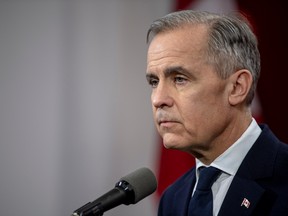Liberal leader said there’s been a ‘very clear refutation’ of the allegations by his doctoral supervisor
Article content
OTTAWA — Liberal Leader Mark Carney dismissed allegations that he may have plagiarized passages in his 1995 doctoral thesis in economics from Oxford University, as first revealed by the National Post last Friday.
Article content
Article content
His thesis, titled “The Dynamic Advantage of Competition,” shows 10 instances of apparent plagiarism — ranging from full quotes to slightly modified quotes without proper attribution — according to three university academics who reviewed the material.
Advertisement 2
Article content
They include Geoffrey Sigalet, an assistant professor at UBC Okanagan and member of the president’s advisory committee on student discipline, as well as two other Canadian professors who asked to remain anonymous out of fear of a lawsuit from Carney.
“He’s just directly repeating without quotations. That’s what we call plagiarism,” said Sigalet. Another professor said it was “the most sophisticated plagiarism” he’s seen, and a third one said it meets “just about any reputable institution’s definition of plagiarism.”
“I’m pleased that there’s such interest in my doctoral thesis. It’s sort of languished on the shelf for over three decades,” said Carney in response to a question from the National Post during a campaign announcement in Winnipeg on Tuesday.
He added there had been a “very clear refutation” of these allegations by his doctoral supervisor, Margaret Meyer, Official Fellow of Economics at Nuffield College at Oxford.
Recommended from Editorial
Article content
Advertisement 3
Article content
Meyer said in a statement, that appeared in the Post’s original article, that she saw “no evidence of plagiarism … nor any unusual academic practices” in Carney’s work.
Jonathan Bailey, a U.S.-based plagiarism consultant and author of the website PlagiarismToday, also reviewed the material at the National Post’s request. After a thorough analysis, he said he understands why “academics have been split on this.”
“I see that this fits a pattern I’ve seen in other academics accused of plagiarism, particularly in the United States,” he said.
“Carney clearly did not do a perfect job writing this dissertation. It’s clear that he mixed text from his sources with original writing.”
In his thesis, Carney refers extensively to Michael E. Porter’s 1990 book, “The Competitive Advantage of Nations.” But he duplicated parts of Porter’s work and presents several sentences — sometimes with minor tweaks to the wording — as his own.
He used near-verbatim wording of an excerpt from Jeremy C. Stein’s 1989 article published in The Quarterly Journal of Economics and another article Stein wrote in the Journal of Political Economy in 1988 without giving credit to the original author.
Advertisement 4
Article content
He also duplicated a sentence from H.S. Shin’s 1994 article in the RAND Journal of Economics, Vol. 25, No. 1, and only altered a single word.
Bailey said that while some passages in the thesis were “clear examples of copy-and-paste plagiarism,” he noted that the sources of the material were cited elsewhere in his work and that the troublesome passages make up a “tiny percentage” of the total work.
“If we follow the strictest definition of plagiarism, then it is plagiarism. But it sits on the lower end of the seriousness scale. Both the kind of plagiarism, the material plagiarized, and the amount all point to this being a relatively minor case,” he said.
Oxford University has so far refused to weigh in on the issue.
National Post
Get more deep-dive National Post political coverage and analysis in your inbox with the Political Hack newsletter, where Ottawa bureau chief Stuart Thomson and political analyst Tasha Kheiriddin get at what’s really going on behind the scenes on Parliament Hill every Wednesday and Friday, exclusively for subscribers. Sign up here.
Article content








